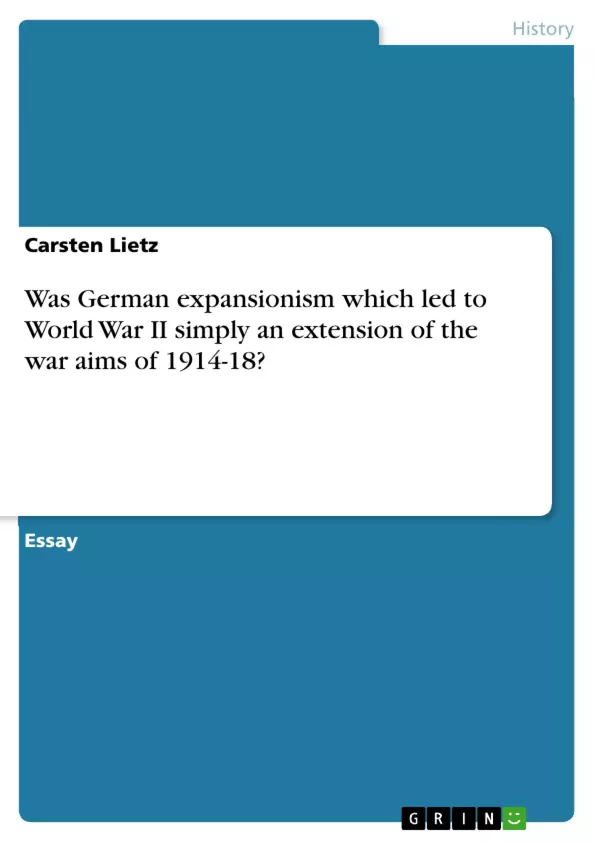Were it only the exceptional ideas and plans of Adolf Hitler and his NSDAP that led to World War II or did the Führer only succeed in the old aims of German foreign - and in the end - war policy of the former empire? If yes, it would not be only Hitler’s war, but a German war which could not be reduced any longer to the Nazi-ideology, but to a constant German policy, independent of the political system until the end of World War II.
It has to be explained, which aims Germany followed in World War I and World War II, why it followed them, who supported these aims in Germany and why, and of which kind their aims’s ideological background was.
Table of Contents
- The Problem
- The Aims of War
- Ideologies and Origins
- Before the Wars Began
- Conclusion
Objectives and Key Themes
This essay examines the extent to which German expansionism in World War II was simply an extension of the war aims of 1914-18. It analyzes the aims of German foreign policy in both wars, comparing the territorial and technical ambitions of the German government and the Nazi regime.
- The relationship between German expansionism in World War I and World War II
- Comparison of German war aims in both conflicts
- Influence of ideology and historical context on German expansionism
- Analysis of key figures and their roles in shaping German foreign policy
- Exploration of the concept of German national identity and its connection to expansionism
Chapter Summaries
- The Problem: This chapter introduces the central question of the essay: Did Hitler's war aims fundamentally differ from those of the German government in World War I, or were they simply a continuation of previous expansionist ambitions? It highlights the need to explore the historical context and ideological factors that shaped German foreign policy.
- The Aims of War: This chapter focuses on the specific territorial and technical aims of Germany in both World Wars. It analyzes key examples, such as the German desire for Alsace-Lorraine, Belgium, and Poland, as well as the goal of economic domination in Central Europe. The chapter also examines the role of figures like Bethmann Hollweg and Hitler in shaping these ambitions.
Keywords
German expansionism, World War I, World War II, territorial aims, economic domination, Central Europe, Alsace-Lorraine, Belgium, Poland, Bethmann Hollweg, Hitler, Nazi ideology, German national identity.
Frequently Asked Questions
Was Hitler's expansionism a continuation of WWI aims?
The essay explores whether Nazi foreign policy was a radical break or a continuation of the imperial German policy (e.g., Bethmann Hollweg's plans) aimed at European hegemony.
What were the German war aims in 1914-1918?
Imperial Germany aimed for territorial gains in Belgium, Poland, and Alsace-Lorraine, as well as economic domination of "Mitteleuropa" (Central Europe).
How did Nazi ideology change expansionist goals?
While territorial goals overlapped, Nazi ideology added a racial dimension (Lebensraum in the East) and the goal of total racial restructuring of the continent.
Who supported these expansionist aims in Germany?
Support came from various sectors, including the military leadership, industrial elites, and nationalist political circles, independent of the specific political system.
Is World War II considered "Hitler's War" or a "German War"?
The paper discusses whether the conflict can be reduced solely to Nazi ideology or if it was the culmination of a long-standing German policy of power expansion.
- Quote paper
- Carsten Lietz (Author), 1995, Was German expansionism which led to World War II simply an extension of the war aims of 1914-18?, Munich, GRIN Verlag, https://www.grin.com/document/6000



